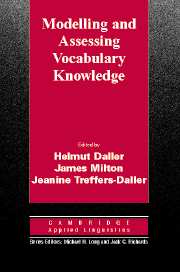Book contents
- Frontmatter
- Contents
- List of contributors
- List of abbreviations
- Acknowledgements
- Foreword
- Series Editors' Preface
- Editors' introduction
- I Fundamental issues
- II Vocabulary and learner differences
- III The unit of assessment and multiple vocabulary measures
- Chapter 4 Validity and threats to the validity of vocabulary measurement
- Chapter 5 Comparing measures of lexical richness
- Chapter 6 Productive vocabulary tests and the search for concurrent validity
- Chapter 7 Exploring measures of vocabulary richness in semi-spontaneous French speech
- Chapter 8 Lexical richness and the oral proficiency of Chinese EFL students
- IV Metaphors and measures in vocabulary knowledge
- V Vocabulary measures in use
- References
- Appendices
- Index
Chapter 7 - Exploring measures of vocabulary richness in semi-spontaneous French speech
Published online by Cambridge University Press: 04 May 2010
- Frontmatter
- Contents
- List of contributors
- List of abbreviations
- Acknowledgements
- Foreword
- Series Editors' Preface
- Editors' introduction
- I Fundamental issues
- II Vocabulary and learner differences
- III The unit of assessment and multiple vocabulary measures
- Chapter 4 Validity and threats to the validity of vocabulary measurement
- Chapter 5 Comparing measures of lexical richness
- Chapter 6 Productive vocabulary tests and the search for concurrent validity
- Chapter 7 Exploring measures of vocabulary richness in semi-spontaneous French speech
- Chapter 8 Lexical richness and the oral proficiency of Chinese EFL students
- IV Metaphors and measures in vocabulary knowledge
- V Vocabulary measures in use
- References
- Appendices
- Index
Summary
Introduction
Mastering the vocabulary of a language is one of the key tasks facing children who are acquiring their L1 and learners of foreign or second languages (Laufer, 1994; Vermeer, 1997; Verhallen and Schoonen, 1998). Speakers continue to learn new words well into adulthood (Hall, Paus and Smith, 1993), even when the acquisition of the grammar has been completed, for example when they enter higher education as young adults, or when they start a new job which has its own professional register, or when they learn new words that are being coined for new inventions. It would be difficult for any speaker (native or non-native) to claim that they ‘know’ the vocabulary of a particular language, first of all because it is difficult to say how many words there are in a language (Hall et al., 1993). Second, adult native speakers differ widely from each other with respect to the number of words they know or use on a daily basis, as this is dependent on a range of factors, such as educational background, the need to use a particular language at work, reading habits, and so on. It is also very difficult to define how many words one must know in order to begin a university course, for example (Hazenberg and Hulstijn, 1996).
Because of the importance of vocabulary for the everyday lives of speakers in general, and because vocabulary knowledge is one of the major predictors of school success (Verhallen and Schoonen, 1998), researchers are interested in developing reliable and valid vocabulary measures.
- Type
- Chapter
- Information
- Modelling and Assessing Vocabulary Knowledge , pp. 133 - 149Publisher: Cambridge University PressPrint publication year: 2007
- 8
- Cited by



